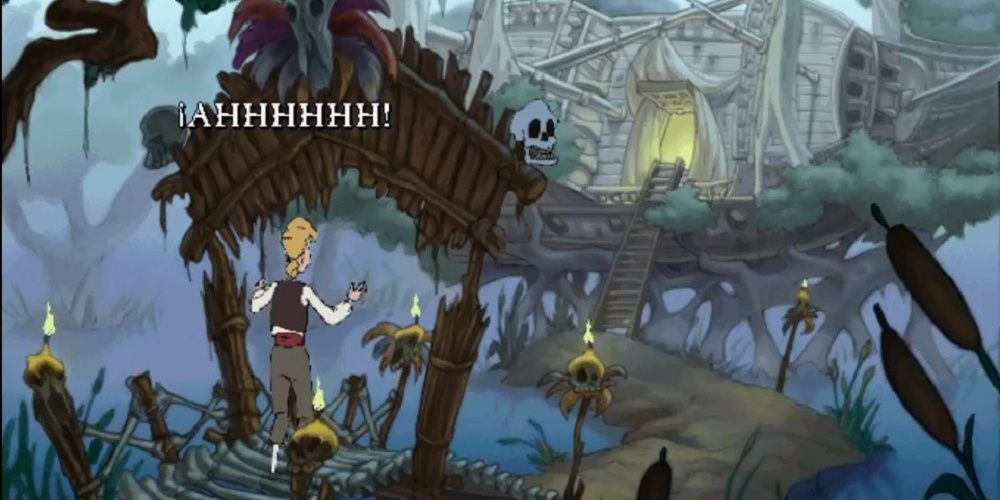Good old comfort gaming. We all do it. We look at our immense backlogs, the reams of indie classics waiting to be discovered and triple-A titans determined to demand our free time, and we turn away, instead choosing to pick up an old faithful. Something from our childhoods, probably. I have a good few of these waiting in the wings at any one time. Crash Bandicoot, Spyro the Dragon, Pokemon Gold, Dungeon Keeper, Final Fantasy 9 – all games I can play blindfolded and still enjoy.
The most perplexing of these evergreen games is The Curse of Monkey Island. For those not in the know, first of all, go play this game, it’s incredible. Secondly, it is a point-and-click adventure game featuring a witty protagonist, a joyous, anachronistic world, and lots of fun puzzles to work out. The problem is that I know the game like the back of my hand – I know how to get Guybrush tarred and feathered to imitate the devil chicken, I know how to get him to fake his own death to break into a mausoleum, and I know how to foil the dread pirate LeChuck. Why is it still fun for me, when it is now functionally a visual novel at this point?
Some will say that it’s the very lack of surprise that makes these comforts so comfortable – when you know exactly what’s coming next, you can experience a game rather passively. You don’t have to put much mental exertion into it, so it’s a comfy way to spend your time. My personal theory is that it also has a great deal to do with nostalgia. In their paper Nostalgia: Content, triggers, functions, Wildschut et al. define nostalgia as "a sentimental longing for the past", and a bittersweet feeling. I’m not saying that by playing old games from our childhood that we’re living in the past, but I think the psychology behind nostalgia goes some way to explain why we might do it.
But nostalgia is a comforting feeling for most. In Verplanken’s When Bittersweet Turns Sour, there are suggestions that there is a more pronounced association between nostalgia and positive affect in those that suffer from depression or anxiety. Indeed, the Wildschut study found that the most common trigger for nostalgia was negative affect, which would imply that nostalgia is a compensatory emotion. This definitely tracks with me; I can look back at recent years and identify a significant trend of nostalgic gaming coinciding with the tougher times in my life. When things get rough, I chuck on the games that remind me of the days when life wasn’t so complicated, and we didn’t have to contend with pandemics and inflation and Netflix cancelling good TV shows.
Ortony et al. conducted a study in The Cognitive Structure of Emotions that concluded that, while feelings of nostalgia are usually categorised as positive, they are often tinged with the negative: the bitter in the bittersweet. Verplanken goes on to say that habitual worriers should avoid nostalgic triggers, as they may be a harmful coping mechanism. If we are using nostalgic gaming to remember the better times, it may be the loss of these better times that leads to those deeper sadnesses or feelings of introspection later down the line. It’s a very dim view of something that should be joyful – remembering the past through the comforting inception of a lifelong hobby – but I think it’s an idea worth examining. The Curse of Monkey Island is comforting to me, but there are no new mysteries to solve or discoveries to make – the jokes don’t even elicit a laugh any more, just like I don’t laugh when rewatching old episodes of Futurama or Frasier. These things comfort me, yes, but those feelings don’t compare to the excitement and surprise I feel when exploring something totally novel.
I’m not saying that indulging in a bit of nostalgic comfort gaming is indicative of any big emotional problems in a person’s life, but I do think we could all do with a bit more introspection about why we do the things we do. It’s healthy. Now, don’t mind me, I’m off to fight Ripto for the seventeenth time.
Source: Read Full Article
